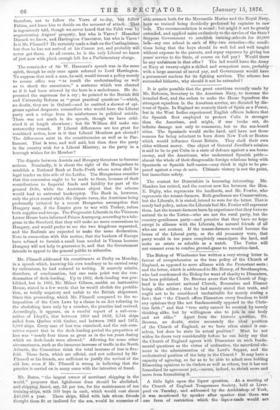Mr. Plimsoll addressed his constituents at Derby on Monday, in
a speech which, knowing his own tendency to be carried away by enthusiasm, he had reduced to writing. It scarcely admits, therefore, of condensation, but one main point was the con- demnation of deck-loading. Up to 1862, deck-loading was pro- hibited, but in 1862, Mr. Milner Gibson, amidst an inattentive House, stated in a few words that he would abolish the prohibi- tion, as totally nugatory and unfair to the British shipowner. Since this proceeding, which Mr. Plimsoll compared to the re- imposition of the Corn Laws by a clause in an Act referring to the abolishing laws only by a number, the practice had revived. Accordingly, it appears, on a careful report of a sub-com- mittee of Lloyd's, that between 1850 and 1859, 3,794 ships sailed from Quebec with timber, and between 1862 and 1872, 3,068 ships. Every case of loss was examined, and the sub-com- mittee report that in the deck-loading period the proportion of loss was "nearly four times as great as in the ten years during which no deck-loads were allowed." Allowing for some other circumstances, such as the immense increase of traffic in the North Atlantic, the Committee think the total increase of loss is five- fold. These facts, which are official, and not collected by Mr. Plimsoll or his friends, are sufficient to justify the revival of the old law, even if Mr. Plimsoll is wrong in believing that the practice is carried on in many cases with the intention of fraud.


































 Previous page
Previous page